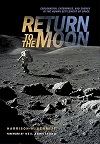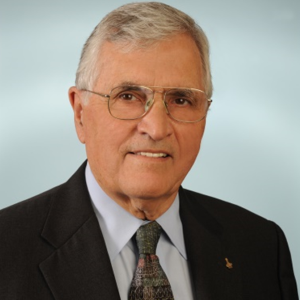Geologist, and Former NASA Astronaut,
University Professor, and U.S. Senator
One of the last living moonwalkers, Dr. Harrison Schmitt was NASA’s first scientist astronaut. The only geologist to have visited and conducted fieldwork on the moon, Dr. Schmitt has been a tireless advocate of space exploration for decades. He shares his experience to inspire today’s STEM community and raise awareness of the multiple solutions further lunar exploration could bring to some of greatest challenges humanity is facing today.
Moonwalker
After a rigorous selection process, Dr. Schmitt joined NASA in the 1960s and trained the early Apollo astronauts to do effective geological research. In 1972, he piloted the Apollo 17 lunar module, making his own historical trip as the first trained scientist and second-to-last person to step on the moon. During his 22-hour extravehicular exploration of the lunar surface, he collected data and rock samples that dramatically shaped the scientific community’s knowledge of the moon’s history and geological composition.
After Apollo
Following his retirement from NASA, Dr. Schmitt served as a U.S. Senator for New Mexico. More recently, he worked with the NASA Advisory Council and the Planetary Society. He is an inductee in the Astronaut Hall of Fame and holds honorary degrees from nine different U.S. and Canadian universities.
Books
Dr. Schmitt’s book Return to the Moon: Exploration, Enterprise, and Energy in the Human Settlement of Space argues the economic benefits of further lunar exploration based on his analysis that there are abundant sources of energy present on the moon. He is currently working on a second book, Apollo 17: Diary of the Twelfth Man.
Education
Dr. Harrison Hagan “Jack” Schmitt possesses a remarkably diverse biography. He studied at Caltech, as a Fulbright Scholar at Oslo, and at Harvard, receiving his Ph.D. in geology in 1964. Dr. Schmitt trained as an Air Force jet pilot in 1965 and received Navy helicopter wings in 1967.
NASA
Selected for the Scientist-Astronaut program in 1965, Dr. Schmitt organized the lunar science training for the Apollo Astronauts and served as lunar module pilot for Apollo 17. In 1972, he was the only scientist and the last of the 12 men to walk on the Moon.
Senator
In 1975, Dr. Schmitt became a U.S. Senator for his home state of New Mexico, a position he held through 1982. He later served on the President’s Foreign Intelligence Advisory Committee and the President’s Commission on Ethics Law Reform.
Keynote Speaker
Today, Dr. Schmitt consults, speaks, and writes on business, public, and governmental initiatives, particularly in the fields of space, risk, geology, energy, technology, and policy issues of the future. He also contributes nonfiction articles on space and the American Southwest to numerous books and magazines.
Affiliations
He is a member of the Independent Strategic Assessment Group for the U.S. Air Force Phillips Laboratory. Schmitt’s corporate board memberships include Orbital Sciences Corporation and the Draper Laboratory.
Awards
Dr. Schmitt has been inducted into the Astronaut Hall of Fame and the International Space Hall of fame and has received honorary degrees from nine U.S. and Canadian Universities. In recognition of past service, the U.S. Department of State in July 2003 established the Harrison H. Schmitt Leadership Award for U.S. Fulbright Fellowship awardees. He also traveled in Europe in 2009 as a Speaker and Specialist for the State Department. In 2007, Schmitt was awarded the first Eugene M. Shoemaker Memorial Award by Arizona State University and is the first recipient of the National Space Society’s Gerard K. O’Neill Memorial Space Settlement Award. He has also been awarded the 2010 inaugural Columbia Metal by the Aerospace Division of the American Society of Civil Engineers.
Honors
More recently, the College of Arts and Sciences of the University of Tennessee-Knoxville conferred upon him the distinguished degree of Doctor of Science and Humane letters in Earth and Planetary Sciences on May 13, 2017.
A Trip To The Moon and Beyond
Management Lessons of the Apollo Project
A Business Initiative To Return To The Moon
Principles For Environmental Risk And Benefit/Cost Assessment
Space Law And The Future
Living With Climate Change
All Harrison Schmitt Books

Return to the Moon: Exploration, Enterprise, and Energy in the Human Settlement of Space
Purchase Book"We have had nothing but positive feedback since Dr. Schmitt left. We are very happy with both his presentations and all of the additional time he took with students, employees, and the general public."
- | Wake Technical Community College
"The content and presentation of Dr. Schmitt′s material was perfect for the audience, and he was very well received. The majority of the 1800+ conference attendees were present in the hall for his speech. He was very gracious and accommodating and obliged every interview and request for his signature. Very professional, has obviously done this many many times before."
- | Saskatchewan Geological Survey

